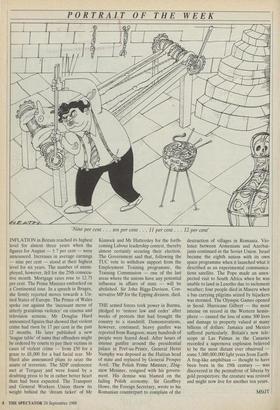PORTRAIT OF THE WEEK
Wine per cent . . . ten per cent . . . 11 per cent . . . 12 per cent'
INFLATION in Britain reached its highest level for almost three years when the figures for August — 5.7 per cent — were announced. Increases in average earnings — nine per cent — stood at their highest level for six years. The number of unem- ployed, however, fell for the 25th consecu- tive month. Mortgage rates rose to 12.75 per cent. The Prime Minister embarked on a Continental tour. In a speech in Bruges, she firmly rejected moves towards a Un- ited States of Europe. The Prince of Wales spoke out against the 'incessant menu of utterly gratuitous violence' on cinema and television screens. Mr Douglas Hurd announced figures that showed that violent crime had risen by 17 per cent in the past 12 months. He later published a new `league table' of sums that offenders might be ordered by courts to pay their victims in cases of violent crime — from £50 for a graze to £8,000 for a bad facial scar. Mr Hurd also announced plans to seize the assets of terrorists. The SDP conference met at Torquay and were found by a doubting press to be in rather better heart than had been expected. The Transport and General Workers Union threw its weight behind the 'dream ticket' of Mr Kinnock and Mr Hattersley for the forth- coming Labour leadership contest, thereby almost certainly securing their election. The Government said that, following the TUC vote to withdraw support from the Employment Training programme, the Training Commission — one of the last areas where the unions have any potential influence in affairs of state — will be abolished. Sir John Biggs-Davison, Con- servative MP for the Epping division, died.
THE armed forces took power in Burma, pledged to 'restore law and order' after weeks of protests that had brought the country to a standstill. Demonstrations, however, continued; heavy gunfire was reported from Rangoon; many hundreds of people were feared dead. After hours of intense gunfire around the presidential palace in Port-au-Prince, General Henri Namphy was deposed as the Haitian head of state and replaced by General Prosper Avril. The Polish Prime Minister, Zbig- niew Messner, resigned with his govern- ment. His demise was blamed on the failing Polish economy. Sir Geoffrey Howe, the Foreign Secretary, wrote to his Romanian counterpart to complain of the destruction of villages in Romania. Vio- lence between Armenians and Azerbai- janis continued in the Soviet Union. Israel became the eighth nation with its own space programme when it launched what it described as an experimental communica- tions satellite. The Pope made an unex- pected visit to South Africa when he was unable to land in Lesotho due to inclement weather; four people died in Maseru when a bus carrying pilgrims seized by hijackers was stormed. The Olympic Games opened in Seoul. Hurricane Gilbert — the most intense on record in the Western hemis- phere — caused the loss of some 300 lives and damage to property valued at many billions of dollars: Jamaica and Mexico suffered particularly. Britain's new tele- scope at Las Palmas in the Canaries recorded a supernova explosion believed to be the most distant ever observed — some 5,000,000,000 light years from Earth. A frog-like amphibian — thought to have been born in the 19th century — was discovered in the permafrost of Siberia by gold prospectors: the creature was revived and might now live for another ten years.
MStJT






























































 Previous page
Previous page